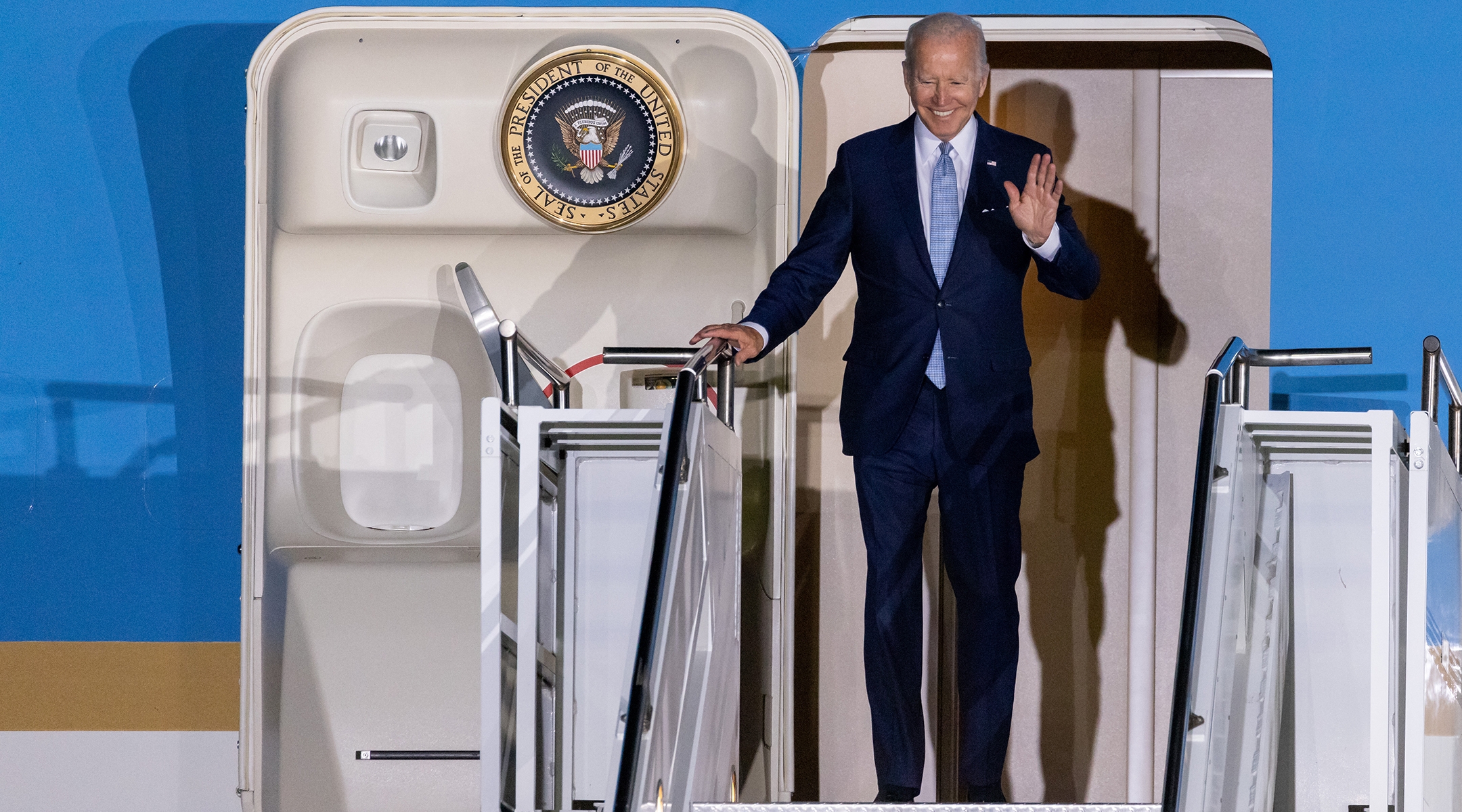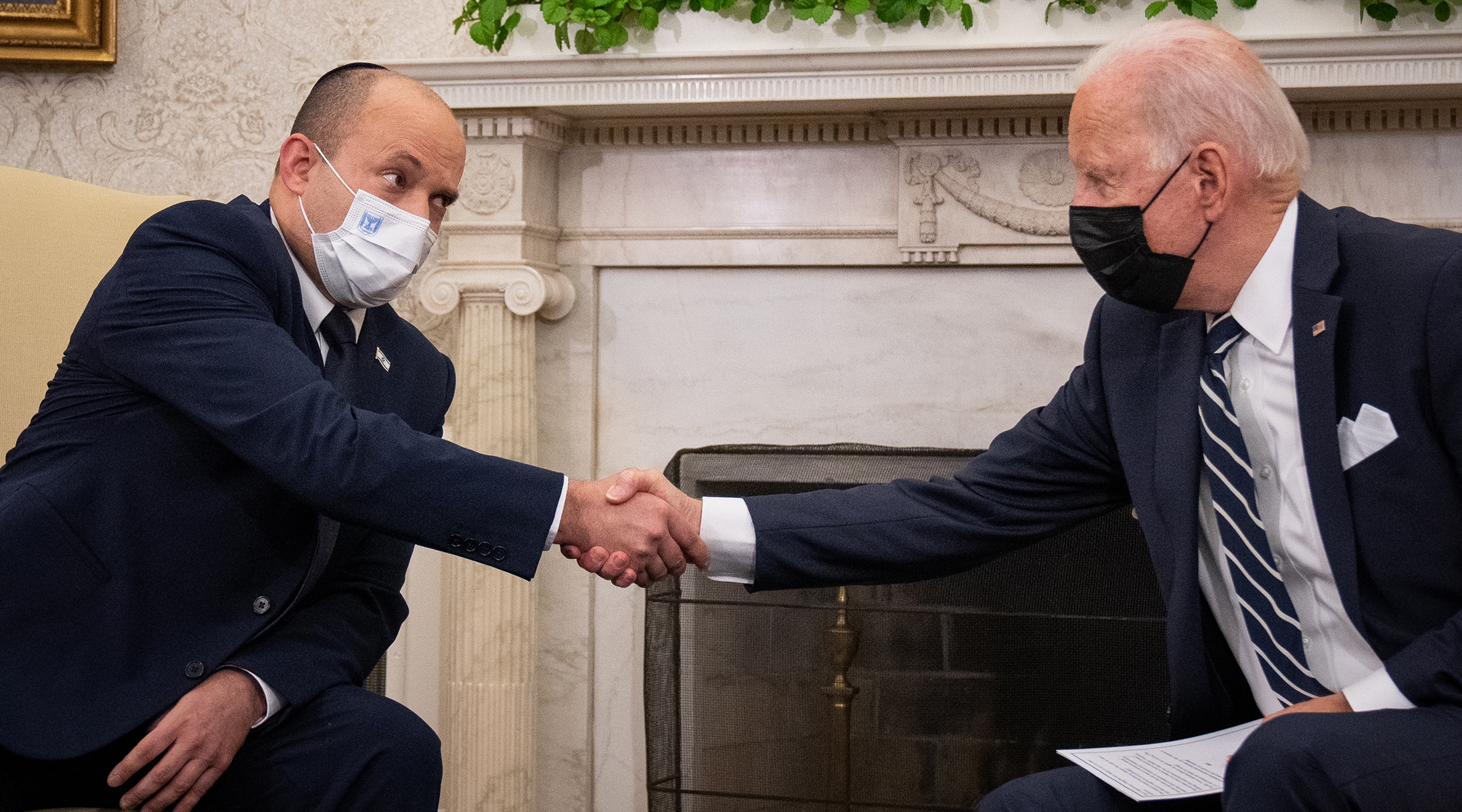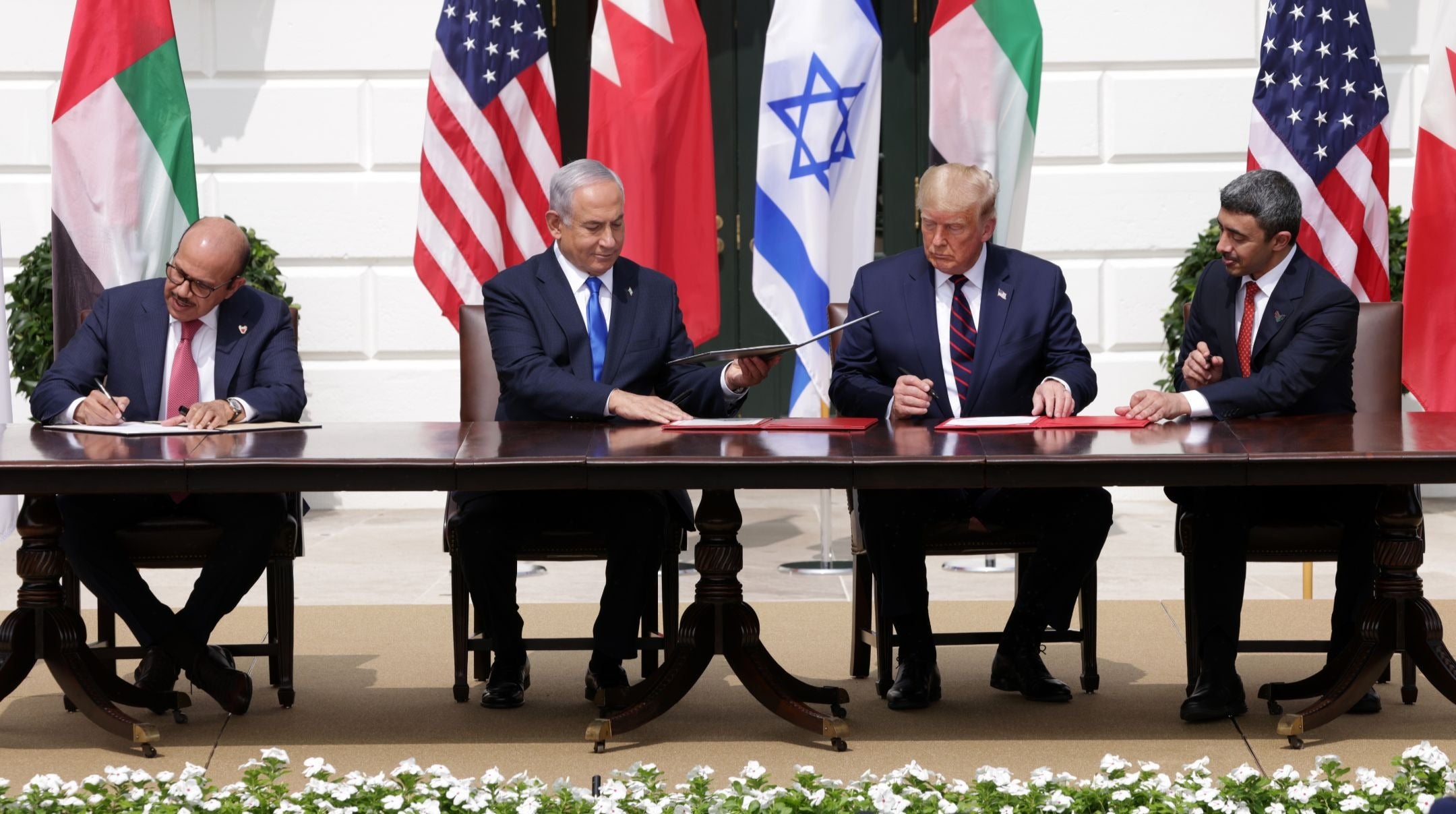Laser beams, Saudis and the ‘Jewish Olympics’: A preview of Biden’s Israel trip
The trip’s many pieces symbolize the different ways that Middle East diplomacy is evolving

President Joe Biden steps off Air Force One upon arrival in Munich, June 25, 2022. (Daniel Karmann/picture alliance via Getty Images)
(JTA) — Joe Biden’s trip to Israel this week, his first as U.S. president, might look on paper like a quick stopover: just two days meeting with Israeli leaders and one day with Palestinian leaders.
But with a day in Saudi Arabia tacked on — a country that Biden had once vowed to make a “pariah” in the region — the trip’s significance in a dramatically evolving Middle East becomes more clear.
While some predicted that Biden might unveil additional Arab countries that could join the Abraham Accords normalization agreements with Israel during his much-anticipated trip, the president is now not expected to make any flashy announcements. Still, several of the trip’s elements underscore how U.S. relations with Israel and its neighbors are changing — and in some senses, how Biden is trying to hold back some of those currents of change, by advancing a two-state vision of peace.
For example, after dealing with former Prime Minister Benjamin Netanyahu for well over a decade and his fellow right-winger Naftali Bennett over the past year, Biden will meet with interim Prime Minister Yair Lapid, who represents a different slice of the Israeli political spectrum ahead of yet another election in the fall.
Biden will also spend time with the Palestinian Authority and its president, Mahmoud Abbas, at what is putting it lightly a low point in Israeli-Palestinian peace negotiations. He could become the first sitting U.S. president to visit a part of Jerusalem outside of Israel’s pre-1967 state lines, excluding the Old City neighborhood.
And Biden’s time in Saudi Arabia symbolizes, among other things, that the United States is putting aside its past misgivings to build stronger ties with the country that Israel has been cultivating as a regional ally against Iran.
There won’t be much time for fun asides, but Biden could also have Jewish sports fans kvelling through his plan to attend the opening of the international Maccabiah Games, often nicknamed the “Jewish Olympics.”
Here’s a quick rundown of what to follow, in order of Biden’s itinerary schedule.
A new (interim) Israeli leader
When Biden lands at Ben Gurion Airport on Wednesday, he will be greeted by a brand-new Israeli prime minister.
After Naftali Bennett dissolved Israel’s government last month, in the wake of a series of coalition defections, then-Foreign Minister Yair Lapid took over as interim leader as per their coalition agreement. Bennett, a right-wing settler leader, and Lapid, a centrist former TV anchor, had formed a historically diverse alliance of parties in large part to oust Netanyahu, who had clung to power through multiple elections even after being indicted on multiple corruption charges. In a show of their ongoing closeness, Bennett will join part of Lapid’s formal sit-down with Biden on Thursday.
Before collapsing under the weight of its many parts, the Bennett-Lapid coalition mostly avoided hot-button topics, such as the Israel-Palestinian conflict, preferring to prove after years of stalemate (the next will be the fifth elections in three years) how a Netanyahu alternative could operate. It also crucially avoided angering a Democratic U.S. administration — something Netanyahu had done repeatedly as he focused on courting Republican leaders, from former President Donald Trump to key senators.
Bennett and Lapid agreed to disagree politely with Biden on issues such as the Iran nuclear deal — a pact widely reviled in Israel that Biden wants restored — and to keep big policy disagreements behind closed doors.

U.S. President Joe Biden meets with former Israeli Prime Minister Naftali Bennett in Washington, D.C., Aug. 27, 2021. (Sarahbeth Maney/Pool/Getty Images)
But Biden will also meet with Netanyahu on Thursday, in part to avoid looking biased before the upcoming Israeli election. Netanyahu has a path, even if a tight one, to return to power, based on recent polling.
Lapid, who will look to lead another winning coalition (Bennett is taking a break from politics) represents a different look at home compared to Netanyahu, especially on social and religious issues. He supports religious reforms and promoting egalitarian prayer throughout Israel, for example; last week he said that periodic violence against non-Orthodox worshippers at the Western Wall “cannot continue.”
And on the world stage, on which Biden is more focused, Lapid also takes a slightly different tack than his immediate predecessors: tougher on Russian president Vladimir Putin and more open to dialogue with the Palestinians.
Real Jewish space lasers
In addition to the formal meetings, a key expected part of Biden’s visit with Israeli officials is his scheduled tour of an Israeli air force base. There he will receive an update on the Iron Dome defense system, which works to intercept incoming missiles, often from Gaza — and which the United States gave an extra $500 million to replenish after Israel’s conflict with Gaza last year.
Hamas militants had begun to crack the code on how to overwhelm the Iron Dome during last year’s fighting. But worries about counter-missile supply could soon be a thing of the past, as Israel will introduce Biden to its still-developing “Iron Beam” system, which in testing has shown that it will likely be able to down missiles with laser beams. The Times of Israel reports that Biden could even announce that the United States will look to purchase Iron Beam technology.
History at the Maccabiah Games
The Maccabiah Games, often referred to as the Jewish Olympics since its founding in the 1930s, attract thousands of Jewish athletes from dozens of countries, who compete in several Olympic sports. With their narrow focus on Jewish athletes, the games don’t usually make international headlines.
But Biden — a huge sports fan — is about to give the Maccabiah a presidential-sized boost.
Israeli media is reporting that he will interact with athletes at the games’ opening ceremony on Thursday evening, likely the first-ever appearance by a U.S. president at such an event. He would be accompanied by Lapid, Israeli President Isaac Herzog — and a security apparatus large enough to significantly disrupt the opening parade.
A two-state solution comeback?
Last week, Lapid held a phone call with Abbas, his Palestinian Authority counterpart, who also hosted Defense Minister Benny Gantz at the PA president’s residence.
That might sound like a normal week for the leaders of neighboring territories who cooperate closely on security concerns in a turbulent region. But it was the first time that a call between Abbas and an Israeli prime minister had been confirmed in years.
Despite recent attempts by various world powers to call for summits and commitments to two-state solution dialogue, Israeli and Palestinian leaders have not engaged in serious peace talks since 2014.
During his long and momentous tenure, Netanyahu veered away from backing a two-state solution, the outcome long sought by the majority of the Western foreign policy establishment. Netanyahu threatened to annex parts of the West Bank in 2020, a move that spooked Donald Trump’s administration and further infuriated Palestinian leadership, who were already not on speaking terms with Israeli leaders.
As a sign of how far the Israeli establishment has drifted on the issue, even Lapid, who in theory supports the two-state concept, admitted last year that there is “no current plan” to advance it. (One unconfirmed report claims that just days before Biden’s visit, Lapid has agreed to meet with Egyptian and Palestinian leaders to restart peace talks.)
Biden has prioritized saving the two-state solution, and it will be telling to see if he uses that specific language on this trip. In a significant gesture, he will visit a hospital on Friday in largely Palestinian East Jerusalem, which Palestinians see as the capital of a future state. It could be the first visit to the area by a sitting U.S. president; Biden is likely to announce renewed funding for the hospital.
Biden will then meet with Abbas in Bethlehem, where he will announce a new slate of economic aid to the PA, according to Israeli officials, and a series of additional goodwill steps that Israel has agreed to take (such as allowing Palestinians to upgrade their broadband internet capabilities). That will mark a further break from the policies of Trump, who slashed U.S. aid to the Palestinians by hundreds of millions of dollars and shuttered the U.S. consulate in East Jerusalem.
Biden, who restored much of that funding, also supports reopening that consulate. But he will not announce any plans on that front during this trip, especially since he needs Israel’s buy in to reopen it.
A Saudi switch
Just a few years ago, the realities underlying Biden’s upcoming trip to Jeddah, Saudi Arabia — where he will fly to on Saturday for a conference of several Gulf nations — would have been laughed at.
The brutal death of Jamal Khashoggi — a journalist critical of Saudi Arabia’s government who the CIA determined was killed at the behest of Saudi Crown Prince Mohammed bin Salman — enraged and frightened Western powers. On the presidential campaign trail, Biden said if elected he would make the Saudis “pay the price, and make them in fact the pariah that they are” in the Middle East.
But 2020 brought the advent of the Abraham Accords, a series of diplomatic normalization agreements with Israel signed by some of its formerly antagonistic neighbors. Suddenly Israel and Saudi Arabia, two of the region’s strongest powers, both opposed to Iran’s increasing military aggression, began to see a path towards putting aside decades of mutual isolation.
Saudi Arabia has long conditioned diplomacy with Israel on the creation of a Palestinian state. But just months after the first Abraham Accords were signed, with the United Arab Emirates and Bahrain, a senior member of the Saudi royal family, called Palestinian leaders “failures.”

By now, Israel and Saudi Arabia communicate about security and other issues, and many commentators believe it is only a matter of time before the Saudis join the Abraham Accords. U.S. Ambassador to Israel Tom Nides told Haaretz that no announcement would be made on Biden’s trip.
A source familiar with details of the trip predicted that Saudi Arabia will announce permission for Israeli flights to fly over Saudi airspace. Biden’s direct Tel-Aviv to Jeddah flight is in itself rare; the Saudi government told reporters following the Biden trip that anyone traveling with an Israeli passport would not be allowed to fly to Jeddah.
It is unclear how or if Biden will discuss Israel and the Abraham Accords issues on his stop in Saudi Arabia, as he will look to focus on oil reserves, with the goal of tackling high gas prices at home. Discussions about forming a military alliance of Arab states to counter Iran, which foments instability throughout the Middle East (and regularly calls for the violent destruction of Israel) seems more likely. But whatever happens, it is clear that a new Israel-United States-Saudi Arabia nexus is building steam.
Other potential wild card issues
Even though Biden and his Israeli counterparts have kept their disagreements at a low volume, that does not mean that daylight between the two countries could be revealed during the trip.
First and foremost, the Biden administration has repeatedly made clear that it strongly opposes any new settlement construction and any demolition of Palestinian housing in the West Bank — even as new settlement housing was steadily built throughout Bennett’s tenure, and as Israeli authorities have begun clearing Palestinians out of the Masafer Yatta collection of villages in the South Hebron Hills.
The Israeli legal debate over the status of Masafer Yatta, which has unfolded over two decades, prompted substantial protest from American lawmakers and activists leading up to Biden’s trip. Over 80 Democrats sent Biden a letter urging him to prevent any further evictions in the area, and a group of prominent Jewish organizations, including the Reform movement, followed suit with a letter on Monday.
State Department spokesman Ned Price recently said that the United States is “watching this case very closely.”
And just last week, the ongoing (and in many cases literal) fight over pluralism at the Western Wall exploded again, as a group of haredi Orthodox men physically attacked a group of non-Orthodox worshippers celebrating a bar mitzvah. It’s a scene that has played out for years, as Israel’s government has failed to follow through on its stated plan to expand the area for egalitarian prayer at the site, one of the holiest in Judaism.
American Jewish groups, especially those representing non-Orthodox denominations, have long pushed for the plan and for greater acceptance of non-Orthodox institutions in Israel. Rabbi Jacob Blumenthal, head of the United Synagogue of Conservative Judaism, will join Biden and Lapid on Thursday, along with William Daroff, chair of the Conference of Presidents of Major Jewish Organizations.
Lapid has been more receptive than his predecessors to the chorus of protest.
“I am against all violence at the Western Wall against people who want to pray as their faith allows them,” he said last week. “This cannot continue.”
Ron Kampeas contributed reporting.
This article originally appeared on JTA.org.














